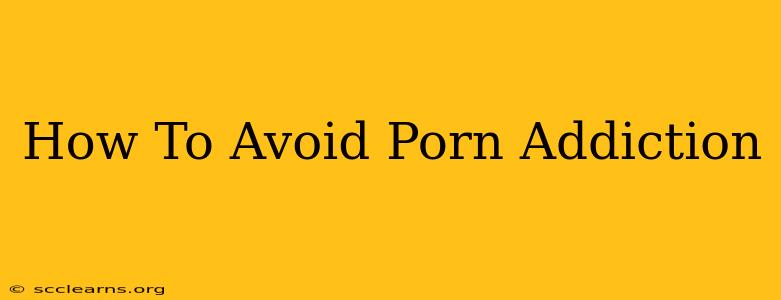Porn addiction is a serious issue affecting millions worldwide, but it's crucial to remember that recovery is possible. This comprehensive guide provides practical strategies and resources to help you break free from the cycle of porn addiction and build a healthier, more fulfilling life.
Understanding Porn Addiction
Before diving into solutions, it's essential to understand what constitutes porn addiction. It's not simply about watching pornography; it's about the compulsive behavior and the negative consequences it brings. These consequences can include:
- Relationship problems: Strained intimacy, trust issues, and communication breakdowns.
- Mental health issues: Depression, anxiety, low self-esteem, and feelings of shame and guilt.
- Physical health issues: Sleep disturbances, decreased libido, and even erectile dysfunction.
- Financial problems: Spending excessive amounts of money on accessing pornographic material.
- Social isolation: Withdrawing from social interactions and relationships.
Identifying the Signs of Porn Addiction
Recognizing the signs is the first step towards recovery. Do you relate to any of the following?
- Spending excessive time consuming pornography: Neglecting responsibilities and relationships.
- Unsuccessful attempts to quit: Repeatedly relapsing despite your best intentions.
- Feeling guilty or ashamed: Experiencing significant emotional distress after viewing pornography.
- Lying about your pornography use: Hiding your behavior from loved ones.
- Neglecting important aspects of your life: Prioritizing pornography over work, school, or personal relationships.
Strategies for Overcoming Porn Addiction
Breaking free from porn addiction requires a multi-faceted approach. There's no one-size-fits-all solution, but the following strategies can significantly increase your chances of success:
1. Seek Professional Help
This is arguably the most important step. A therapist specializing in addiction can provide personalized guidance, support, and coping mechanisms. They can help you identify underlying issues contributing to your addiction and develop a tailored recovery plan. Consider seeking help from a:
- Therapist specializing in sex addiction: They have specific expertise in addressing this particular addiction.
- Support group: Connecting with others facing similar struggles provides invaluable support and understanding. Groups like Sex Addicts Anonymous (SAA) offer a safe and confidential environment.
2. Accountability and Support
Having someone to hold you accountable is crucial. This could be a trusted friend, family member, therapist, or sponsor from a support group. Sharing your struggles and progress with them can strengthen your commitment to recovery.
3. Develop Healthy Coping Mechanisms
When cravings strike, having healthy coping mechanisms is essential. These could include:
- Exercise: Physical activity releases endorphins, improving mood and reducing stress.
- Meditation or mindfulness: These practices can help you manage cravings and develop self-awareness.
- Spending time in nature: Connecting with nature can be incredibly therapeutic.
- Engaging in hobbies: Pursuing activities you enjoy can provide a sense of accomplishment and fulfillment.
4. Address Underlying Issues
Porn addiction often masks underlying issues like low self-esteem, anxiety, or trauma. Addressing these underlying problems is vital for long-term recovery. Therapy can help you uncover and process these issues.
5. Strengthen Your Relationships
Repairing damaged relationships is a crucial part of the recovery process. Open communication and seeking forgiveness are essential steps in rebuilding trust.
6. Practice Self-Compassion
Recovery is a journey, not a destination. There will be setbacks. It's crucial to practice self-compassion, forgive yourself for mistakes, and learn from them. Don't let relapses derail your progress. View them as opportunities for growth and learning.
Maintaining Long-Term Recovery
Maintaining long-term recovery requires ongoing effort and commitment. Continue to practice the strategies outlined above, and consider incorporating the following:
- Regular therapy sessions: Maintaining regular contact with your therapist provides ongoing support and guidance.
- Continued participation in support groups: The ongoing support of a community can significantly improve your chances of long-term success.
- Self-care practices: Prioritizing your physical and mental health is crucial for preventing relapse.
Overcoming porn addiction is a challenging but achievable goal. By taking proactive steps and seeking support, you can break free from the cycle of addiction and build a healthier, happier life. Remember, you are not alone, and help is available.

